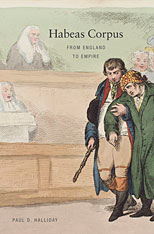Halliday ’83 Receives Inner Temple Book Prize

Paul Halliday ’83, a professor of history n the University of Virginia’s College of Arts and Sciences, recently received the Inner Temple Book Prize for his publication, Habeas Corpus: From England to Empire, published by Harvard University Press. He received the prize in December 2011 in London from Princess Anne, daughter of Queen Elizabeth II, in a ceremony at the Inner Temple, one of four unincorporated associations that have existed since the 14th century to recruit and train barristers.
Presented every three years, the prize of £10,000 is awarded by the royally chartered Inner Temple and is intended to encourage scholarly study of the law in England and Wales. This is the first time it has gone to a non-resident of the British Isles.

Halliday has taught at University of Virginia since 2000 and is an historian of law of the British government. In Habeas Corpus: From England to Empire, he provides a sweeping revisionist account of the world’s most revered legal device and changes the traditional way people understand the writ and democracy. Habeas corpus has been known as the Great Writ of Liberty but history shows us that it is actually a writ of power.
Halliday examined thousands of cases across more than five hundred years to write this history of the writ from the 15th to the 18th centuries. Beginning in the 1600s, English judges used ideas about royal power to empower themselves to protect the king’s subjects. The key was not the prisoner’s right to liberty but the possible wrongs committed by a jailer or anyone who ordered a prisoner detained. This focus on wrongs gave the writ the force necessary to protect ideas about rights as they developed outside of law. This judicial power carried the writ across the world, from Quebec to Bengal.

